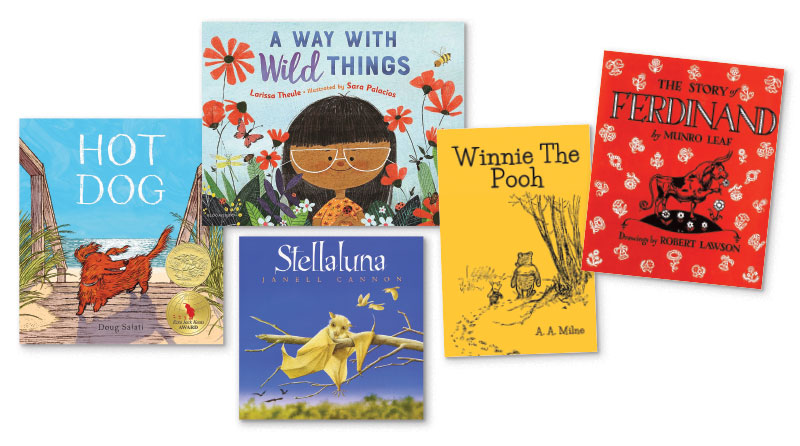Affirming Autism: How to Choose Books for Girls Who are Autistic
Many autistic girls cope by trying to mask who they are. For them and other children, seek books where main characters are appreciated for being themselves and are not required to change.
 |
Photo by Amorn Suriyan/Getty Images |
Related reading: |
Research shows that 80 percent of autistic girls under the age of 18 go undiagnosed. Due to this, many girls with autism grow up not understanding why they feel different or why life is so difficult for them. They feel alone and unaccepted and have been called the “lost girls” by commentators and researchers alike.
My daughter was part of the undiagnosed 80 percent, and so was I. Olivia learned she was autistic during her second year in college. I learned last year.
I now love the way my incredible brain works. Yet, it presents me with an intense world that is challenging to navigate. This is why I thrive with time alone, routine, and hyper-focusing on special interests. All these things bring me comfort and delight and are some of the reasons I love researching nonfiction and losing myself in fictional worlds. Most autistic people also have atypical sensory responses. For me that means that I feel other people’s emotions, even their unspoken ones. This can be so confusing that I might not be able to express my own feelings or even know what they are.
Yet, I knew none of this when I was a girl. My way of coping was to hide who I was. This type of camouflaging, known as masking, is typical of most autistic children. However, studies have found that autistic girls mask the most. This contributes to them going undiagnosed, and in turn creates anxiety, depression, and low self-esteem.
Books are what got me through. Books are what got my daughter through, too. On Olivia’s hardest days, she almost always read Janell Cannon’s Stellaluna. The young bat, like Olivia, landed in a world designed for others. But by the end of the story, Stellaluna no longer had to copy what others did. She learned she was perfect as she was. Olivia loved the reassurance of this. “I always hoped that would happen to me,” she said.

Yet, what would have occurred if someone had handed Olivia a picture book about autism? Would it have meant to her as much as Stellaluna? Would she have read it again and again? The honest answer is, I don’t think so.
Most picture books about autism talk about the challenges the main characters face or the accommodations they are required to make to live in this world. These books are enormously important because they open a window into the life of a person with autism. They help parents, teachers, librarians, and clinicians discuss autism with children.
However, for undiagnosed autistic girls, something more may also be needed. Each autistic girl is her own individual kind of autistic, and she may not recognize herself in a book that portrays another individual’s autistic life. Even more than that, however, day in and day out, autistic girls struggle with their differentness. When they open a book, they may not want to enter a world where another child is struggling. They may yearn for hope. They may be searching for a story where the main character is appreciated for who she is and not required to change.
I have heard writers and editors of children’s literature say that the main character must change, that a story isn’t satisfying unless this happens with a strong character arc. I don’t think this is true, especially for undiagnosed autistic girls. The thing is, every time these girls are told they are weird or different or need to grow a thicker skin, they are being told to change. This hits hard, because they don’t understand their differentness. Change for them often means hiding who they really are, which in turn means increased anxiety and loneliness.
 |
Sandra Nickel (right) with her daughterPhoto courtesy of Sandra Nickel |
What undiagnosed autistic girls need—what all undiagnosed neurodivergent children need—are stories where the character isn’t required to change. They need books like Andrea Beaty’s Ada Twist, Scientist, where Ada’s parents (except for one moment of stress) support Ada for being the hyper-focused girl she is. They need Lyn Miller-Lachmann’s Ways to Play, where Riley’s cousins learn to play Riley’s way. They need Naseem Hrab’s How to Party Like a Snail, where Snail creates a party for his unique, quiet self.
These stories aren’t lesser because the main characters don’t change. Time-honored classics such as Winnie-the-Pooh and Frog and Toad Together have unchanging characters yet are successful because they make the reader feel—feel joyful, feel calmed, feel like they aren’t alone. After all, the satisfaction that lasts the longest is found in the heart.
Stories that are especially golden for autistic girls offer one more thing. It’s there in Stellaluna, and again in Doug Salati’s Hot Dog. In the latter, while other dogs seem to be dealing just fine with a hot day, the protagonist is having a tough time of it. The magic moment comes when the dog stops in the middle of a crosswalk because he can’t deal with another second of his overwhelming day. His owner doesn’t yank on his leash or tell him he’s a bad dog. She doesn’t make him change in any way. She changes the world around him instead.
Days for undiagnosed autistic girls are often just as daunting as the one portrayed in Hot Dog. Life is a struggle for them. There is no getting around that. So, let’s change the world around them, at least for as long as they are within the pages of a book. Let’s give them picture books where the different one isn’t required to change. And by offering these books to all girls, we will inevitably be offering them to those who need them the most, like some of the 80 percent who are undiagnosed.
So, please, keep your eye out for picture books where the main characters are loved for who they are, where they don’t change, where the world changes around them. Read them at story time! Recommend them! Publish them! They, like Stellaluna for my daughter, may be the only things getting undiagnosed autistic girls through their days.
Sandra Nickel is an award-winning children’s book author.
RELATED
The job outlook in 2030: Librarians will be in demand
The job outlook in 2030: Librarians will be in demand
ALREADY A SUBSCRIBER? LOG IN
We are currently offering this content for free. Sign up now to activate your personal profile, where you can save articles for future viewing






Add Comment :-
Be the first reader to comment.
Comment Policy:
Comment should not be empty !!!